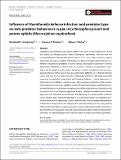Influence of Hamiltonella defensa infection and predator type on anti-predator behaviours in pea (Acyrthosiphon pisum) and potato aphids (Macrosiphum euphorbiae)
Abstract
Facultative endosymbionts can induce benefits and costs to their aphid hosts. In the pea aphid, Acyrthosiphon pisum (Harris) (Hemiptera: Aphididae), infection with the γ-proteobacterium Hamiltonella defensa Moran et al. can confer resistance against parasitoids, but may also reduce the frequency of aggressive and escape behaviours exhibited in response to predators. In potato aphids, Macrosiphum euphorbiae (Thomas) (Hemiptera: Aphididae), H. defensa does not appear to influence susceptibility to parasitism, but its impact on anti-predator behaviours remains unexplored. Here we investigated defensive behaviours in two pea aphid lines (differing in H. defensa-infection status) and four potato aphid lines (that additionally differed in genotype-associated parasitism susceptibility) when faced with foraging ladybirds – Adalia bipunctata (L.) (Coleoptera: Coccinellidae) – and lacewings Chrysoperla carnea (Stephens) (Neuroptera: Chrysopidae). In response to ladybirds, symbiont-infected pea aphids exhibited proportionately fewer evasive defences (dropping and walking away) than non-infected (cured) pea aphids, but more frequent aggressive kicking. Ladybirds provoked more evasive, aggressive, and total defensive behaviours than lacewings. For potato aphids, symbiont status, predator type, and aphid genotype (i.e., assumed parasitism susceptibility) all influenced behavioural repertoires. Overall, infected lines showed greater differentiation in behaviours in response to the two predators than the uninfected lines. The presence of the symbiont H. defensa may be a key determinant of aphid anti-predator behaviours, but the fitness consequences of this are unresolved. In our study, neither symbiont infection status nor aphid genotype affected the number of aphids consumed by predators.
Citation
Humphreys , R K , Ruxton , G D & Karley , A J 2022 , ' Influence of Hamiltonella defensa infection and predator type on anti-predator behaviours in pea ( Acyrthosiphon pisum ) and potato aphids ( Macrosiphum euphorbiae ) ' , Entomologia Experimentalis et Applicata , vol. 170 , no. 11 , pp. 982-992 . https://doi.org/10.1111/eea.13223
Publication
Entomologia Experimentalis et Applicata
Status
Peer reviewed
ISSN
0013-8703Type
Journal article
Description
Funding: RKH thanks the Perry Foundation and the University of St Andrews for funding. AJK is supported by the strategic research program funded by the Scottish Government’s Rural and Environment Science and Analytical Services Division.Collections
Items in the St Andrews Research Repository are protected by copyright, with all rights reserved, unless otherwise indicated.

